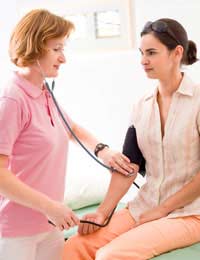Polycistic Ovaries

If you suffer form irregular menstrual periods you may have a condition called Polycistic Ovary Syndrome. This condition affects approximately one in every ten women and can cause infertility.
What are Polycistic Ovaries?
Polycistic ovaries are a condition characterised by irregular periods (menses) and a disruption in the monthly reproduction cycle. In many cases the ovaries in affected women are also marked by the development of numerous large and small cysts which give the condition its name.The Cause of Polycistic Ovaries
The exact cause of this condition is unknown but doctors do know that there is a direct correlation between the development of polycistic ovaries and hormone imbalances. Hormones are released in the body by a signal from the brain. These hormones, or chemical messengers, tell the organs of the body what to do and when. In the case of polycistic ovaries certain chemicals, which regulate the reproductive cycle, insulin levels in the body, and the production of testosterone, are either over or under productive.If the body is signalled to produce too much insulin the ovaries will in turn increase the production of testosterone. The overproduction of these two agents can lead to the symptoms associated with polycistic ovaries syndrome and to problems with the natural function of the ovaries.
The Symptoms of Polycistic Ovaries
Common symptoms associated with Polycistic Ovaries Syndrome include weight gain (caused by the increased production of insulin), acne and the development of excess hair on the face (caused by the overproduction of testosterone), the development of cysts on the ovaries, and infertility.The most common symptom, however, is irregular or absent menstruation. Women who suffer from polycistic ovaries syndrome often have less than eight menstrual cycles each year. The normal reproductive cycle results in a period (menses) once each month, or every twenty-eight days, after an egg has been released and unfertilised. The unfertilised egg is expelled from the uterus through menstruation. In the case of polycistic ovaries hormones are not released regularly so an egg is not released at normal intervals. In severe cases of the condition women may experience the compete absence of menstrual cycles.
Treating Polycistic Ovaries
When a woman sees her doctor to complain about irregular periods the doctor usually runs blood tests to check for polycistic ovaries. These tests are used to check testosterone levels, insulin levels, blood sugar levels, and cholesterol levels. Once a diagnosis pf polycistic ovaries syndrome is confirmed treatment can begin.The most common course of treatment for polycistic ovaries is the prescribing of birth control pills. These pills contain the right balance of hormones responsible for a regular reproductive cycle. Birth control pills can be used to maintain regular menstruation cycles, correct hormone imbalances, improve acne, and diminish excess hair growth by ensuring optimal levels of estrogens, testosterone, and progesterone in the body.
Another treatment option includes the regulation of insulin levels in the body. The drug metformin can be taken to inhibit insulin production. This drug is often used along with birth control pills to further reduce the symptoms of polycistic ovaries syndrome. Once began these medications are usually taken long-term. Frequent check-ups with the doctor will be used to maintain the proper levels of each medication and control the progression of Polycistic Ovaries Syndrome.
- How Your Job Can Hurt Your Tummy
- Antibiotics and Your Tummy
- Diagnosing Abdominal Illness
- MMR Vaccine Scandal and Bowel Problems
- Reduce Your Alcohol Intake
- Prescription Medication and Your Stomach
- Stress and Your Digestive System
- Intestinal Parasites
- All You Need To Know About Constipation
- Leaky Gut Syndrome
- Tumours in the Stomach
- Ovarian Cancer
- Pancreatitis
- Peritonitis
- Stomach Cancer
- Diverticulitis
- Flatulence
- Food Allergies
- Gall Stones
- Menstrual Cramps
- Hernias
- Infections and Bugs
- Endometritis
- Gastroenteritis
- Acid Reflux Disease
- Appendicitis
- Bowel Cancer
- Colitis
- Crohn's Disease
- Digestive Disorders
- What are Peptic Ulcers?
- What is Gastroenteritis?
- What is Irritable Bowel Syndrome?


Re: How Cauda Equina Syndrome Affects the Stomach
@Cutter, Dont worry about what you speak of. It is impossible to balance your gut motility based on your…
Re: Symptoms of Stomach Migraines
When I started menopause 8yesrs ago I had my first stomach attack. With me I start to sweat profusely then comes the pain so…
Re: How Cauda Equina Syndrome Affects the Stomach
I have had cauda equina syndrome now for 10 years. For a considerable amount of that time I took…
Re: Symptoms Of Peptic Ulcers
I also have this chest pain and my heart is beating very fast and painfull and the other thing is that my left side breast it pains.i…
Re: Symptoms Of Peptic Ulcers
I was diagnosed of gastric ulcer after I went for an endoscopy. I have used intravenous rabeprazole and now am using ulsakit. But I…
Re: Symptoms Of Peptic Ulcers
Hello guys, first all of you have to visit gi. And done ugd, then only Dr have to came to know what happened inside your stomach. Yes…
Re: What is Thickening of the Bowel?
I had a virtual colonoscopy and was told I had a thickened left colon. I have acute bouts of lower left abdominal pain which…
Re: What is Thickening of the Bowel?
HI CAN SOME BODY TELL ME WHAT MILD SMALL BOWEL VERSUS IN THICENING RELATED TO UNDERDISTENTION MEAN?
Re: Symptoms Of Peptic Ulcers
Princess gold - Your Question:I av ulcer and I feel tiredness, dizzy, pain under my left breast ? Is it still a sign of ulcer ?
Re: Symptoms Of Peptic Ulcers
I av ulcer and I feel tiredness, dizzy, pain under my left breast ? Is it still a sign of ulcer ?